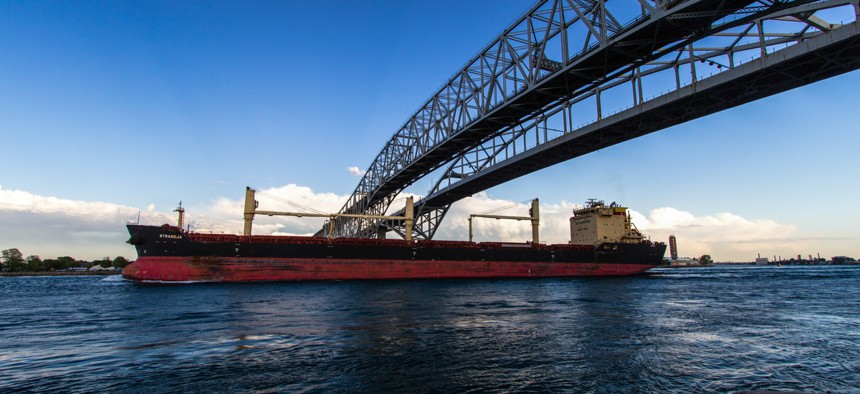Mich., N.D. Governors Warn Ditching NAFTA Could Hurt Their States

The St. Clair River at Port Huron, Michigan, which is connected to Canada via the Blue Water Bridge, a busy international border crossing. Shutterstock
Govs. Rick Snyder and Doug Burgum, both Republicans, say the agreement should be updated, but not nixed.
WASHINGTON — The governors of Michigan and North Dakota on Friday cautioned that if the North American Free Trade Agreement disintegrates, it could put an economic drag on their states.
The Trump administration is in talks to renegotiate the trade pact between the U.S., Canada and Mexico. President Trump has raised the possibility that the deal could be scrapped.
Michigan Gov. Rick Snyder, a Republican, noted that trade with both Canada and Mexico is important for his state's economy, particularly for the automotive industry.
"NAFTA, I believe, has had a lot of benefits, but it’s outdated," Snyder said during an event held by Politico. He added: “I’m concerned, because I think a breakdown in NAFTA, if NAFTA was to fall apart, it could have huge negative consequences."
Snyder said the trade agreement, which went into force in 1994, does not reflect changes over the years in technology and the automotive industry, or adequately address current intellectual property issues.
A seventh round of NAFTA talks is scheduled to get underway Sunday in Mexico City.
U.S. trade with Canada totaled an estimated $627 billion in 2016, according to the Office of the U.S. Trade Representative. Exports were $320 billion and imports were $307 billion.
Canada in 2016 was the largest goods export market for the U.S.
Trade between the U.S. and Mexico totaled about $579 billion in 2016, with an estimated $262 billion of exports and $317 billion of imports. Mexico was the nation's second largest goods export market in 2016.
North Dakota Gov. Doug Burgum, also a Republican, said that trade with Canada is important for his state's agriculture and energy sectors.
"So yeah, we have a lot of concerns," he said.
"We think NAFTA needs to be updated," the governor added. "But absolutely we need to keep trading with our border nations."
He noted that agriculture supply chain infrastructure is integrated across the border. A soybean producer, for instance, might haul their crop to a processing facility in Manitoba, he explained.
“Our economies are so interconnected," Burgum also said.
Snyder said he does not fully know what it would mean for Michigan if NAFTA were to collapse. "What I would say is: 'just having a massive environment of uncertainty slows economic growth,'" he added.
Canada's ambassador to the U.S., David MacNaughton, said at a National Governors Association event held on Friday night at his nation's embassy in Washington that governors had been "quite supportive of modernizing NAFTA, but not getting rid of NAFTA."
Asked what it would mean for states if the U.S. pulled out of the trade agreement, he replied: "There are nine million jobs in the United States depending on trade and investment with Canada."
"I don't think any administration is gonna want to see that put in jeopardy," MacNaughton added.
This post has been updated.
Bill Lucia is a Senior Reporter for Government Executive's Route Fifty and is based in Washington, D.C.
NEXT STORY: State Treasurers Want Advance Refunding Tax Exemption Restored






